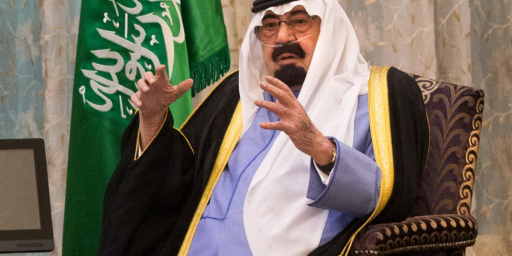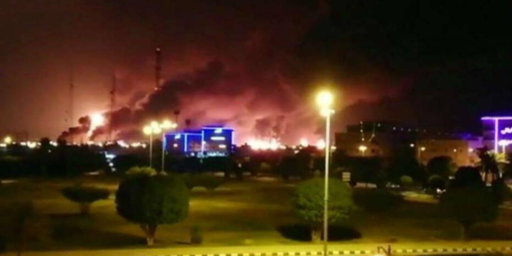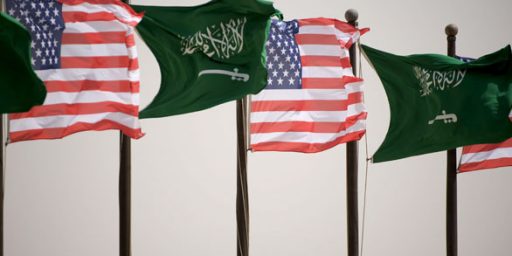Why America Is More Dependent Than Ever on Saudi Arabia
Jad Mouawad and his editors find the fact that the U.S. sent a high-level delegation to the funeral of the potentate nominally in charge of the world’s most important oil producer especially noteworthy.
Why America Is More Dependent Than Ever on Saudi Arabia (NYT | RSS)
President Bush might not have turned up personally in Riyadh yesterday but he certainly sent a high-powered delegation to pay his respects to the new leader of Saudi Arabia, King Abdullah. The American turnout, led by Vice President Dick Cheney, former President George H. W. Bush, and former Secretary of State Colin L. Powell, was the latest signal that relations between the two countries have thawed since the strains of 9/11. But it was also an acknowledgment of a simple fact: like it or not, the United States is more dependent than ever on Saudi Arabia.
“The Saudis are in a great position today,” said Jean-François Seznec, a professor at Columbia University’s Middle East Institute. “We cannot be enemies with everybody. We need their oil desperately.”
Indeed, the alternatives to Saudi Arabia are fewer today than seemed to be the case just three years ago. Predictions of a boom in Iraqi oil have been proved wrong; Iran, OPEC’s second-largest oil producer, is locked on a collision course with the West; Venezuela is following an erratic path; and Russia’s commitment to market reforms and foreign investments seems increasingly unreliable.
All this has added to Saudi Arabia’s already impressive clout. What is more, other powers – mainly from Asia – seek greater access to its resources and have been increasingly courting the Saudis. “They can play the United States against other buyers, like China,” Mr. Seznec said. “And why wouldn’t they?”
American officials, furious over Saudi Arabia’s handling of the investigations after 9/11, recognize this new reality. The warmer relations between Saudi Arabia and the United States were on display last April, when Crown Prince Abdullah – who succeeded his half brother, Fahd, on Monday as king – visited President Bush’s ranch in Crawford, Tex. As a sign of public diplomacy, and personal bonds, they kissed on the cheek and held hands.
Yesterday represented a kind of reunion for the Americans who led the first gulf war in 1991. The United States delegation met with King Abdullah at the monarch’s farm near Riyadh. In any event, the group remained in the country less than four hours. “As the world’s largest producer and as the world’s largest consumer, our two countries have a special relationship,” Samuel W. Bodman, the secretary of energy, said earlier this year after meeting in Washington with his Saudi counterpart, Ali al-Naimi. “We are, at least in certain respects, partners.”
Even the contentious issue of high oil prices has been smoothly swept under the rug. Over the last two years, crude oil prices have more than doubled, and closed yesterday at a record $62.31, up 1.5 percent on the New York Mercantile Exchange. The administration has acknowledged that Saudi Arabia has been doing all it can to step up production, and the current spike was fed by higher demand, not curbs from suppliers.
Perhaps the title of the article should have been “Why the world is more dependent than ever on Saudi Arabia,” though:
Saudi Arabia currently produces about 9 million barrels a day, or 11 percent of world production, out of a total capacity of 10.5 million barrels of oil a day. The bulk of their exports, about 60 percent, goes to Asia, with Japan and China now counting Saudi Arabia as their prime supplier. About 1.5 million barrels a day make it to the United States, about 15 percent of American imports – but Saudi oil executives make it a point, politically, to remain among the nation’s top three suppliers, with Canada and Mexico.
As China and India continue to advance and the overall consumption of petroleum continues to escalate, naturally the countries that produce a major amount of it will continue to escalate. That was predictable. Despite lip service given by politicians over the last thirty-odd years, however, there is little movement in “ridding our dependence on foreign oil.” Perhaps sustained high gas prices will change that.
The 9/11 angle is something else entirely. There’s little doubt that the Saudi royals, in order to bolster their corrupt regime, poured tons of money into the madrassas and otherwise appeased the Islamist radicals. That was of great aid to al Qaeda and its fellow travelers. Still, Osama bin Laden hates the Saudi royals even more than he hates the Bushes. It took Riyahd a long time, and several attacks on its own assets by the terrorists, to wake up. But this is now a classic case of the differences between two governments–enormous though they may be–being put aside in order to unite against a greater common enemy.






The Times article focused far too much on oil. Petroleum is certainly a big part of the US-Saudi relationship, but the USG is smart enough to realize that Saudi Arabia’s importance in the world of Islam is even more important.
What the article also missed is that the US delegation was made up of people whom the Saudi government (and Abdullah in particular) really respects–and the respect is mutual. Further, Abdullah and GW relate to each other on a personal level, not just as heads of state. They don’t agree on all points, but they acknowledge that each is working, honorably, to create a better future.
Instapundit links to this:
http://eurota.blogspot.com/2005/08/big-oil-saudis-must-be-scarier-than.html
While Saudi Arabia is now doing something about direct terrorism (finally), I see no evidence they’ve changed their policy of exporting dissent via Wahabbism. Do you?